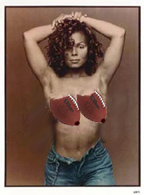Super Bowls are like Woodstock for the six-pack-four-wheeler set. Attendance at one is something of a haj , an attendance at the high altar of American pro sports. This most recent Super Bowl, No. XXXVIII, played in Houston, will probably hold a special place, perhaps more exalted than Joe Namath’s famous prediction, as the one at which, in the half-time show, Janet Jackson, sister of The Bleached One, flashed (ahem) some tit. More has been made of this display of modestly sized, if not modestly covered, boob than of the championship game itself (never under-estimate prurient interest). But, like past Super Bowls, and past exposures of breasts, this one will soon be forgotten. Those who attended will just have a little extra reason to remember “being there.”
In 1988 the Super Bowl was contested in San Diego and I was given to ponder the civic significant of the event, although my observations might have been slightly different has Ms Jackson, and her bosom, been there.

©2004, UrbisMedia
Being There
By the middle of next week it will be all over. The newspapers that were read for every bit of personal profile, prognostication and post mortem will be wrapped around garbage. T-shirts will already have begun to fade from their first wash. The TV crews, reporters, and celebrities will have vanished. Ticket stubs and programs will reside in some memorabilia drawer. Only the effects of overindulgence in food and drink and the yet-to-arrive charge card statements will linger on a bit longer. The party will be over; San Diego will have been prom queen for a day, and Super Bowl ’88 will be history. But what kind of history? What does it all mean? Does it mean anything at all?
In nearly every historical sense Super Bowl ’88 will prove to have been a meaningless event. It will not have diverted the course of history for good or ill; it will not have advanced civilization with any great discoveries; nothing of significance aside from yards rushing and receiving will have been lost or gained. Money will have changed hands, products and services will have been produced and consumed; but it will only have been a brief time-out, a minor distraction, an insignificant hiccup in the course of human events. Indeed, it will have been of no conceivable historical consequence whether the Denver Broncos or the Washington Redskins are victorious.
But, surely, there must be some relevance to an event that can bring an entire nation nearly to a halt on a Sunday in January each year. That fact alone would seem to indicate some significance. There are, of course, the obvious candidate explanations: the money to be made, the thrills of athletic contests, the compulsion to know who is really “No. 1”. But it seems that there are also less obvious reasons for the popularity of such events.
The Super Bowl is what might be called a manufactured event; it is not an event thrust upon us out of time and circumstance. It flows not from the stream of history, but is a fabricated event that attempts to inject itself into history. It is a collusive construct born of a union of interest in the boardrooms of the owners of sports franchises and the media. History’s inevitabilities may include war, natural catastrophes, the extinction of mankind and even the universe, but they do not include the Super Bowl.
My guess is that the underlying appeal of manufactured events like the Super Bowl is that it is an existential product. That is, such events serve a need in us to be spectators in events that provide distinctive benchmarks in our personal histories. We have a need to give our own biographies some historical distinction. It is our need to be there. It makes us feel special, members of an exclusive group if we were there Tunney beat Dempsey, when the American hockey team beat the Russians in the Olympics, or we danced at the Woodstock rock festival. Having been there gives us the special juncture of time an space, affords us a distinction that not everyone can share. It makes us feel special with our own little piece of and place in history—even if it’s a manufactured history.
We are creatures of time and place. But we live in circumstances ruled by more by the clock and the calendar than by the rhythms of nature, and in which place is rapidly being homogenized by the relentless features of mass society. Since the beginning of the modern era in the late 15th century we have gradually stripped our existence of cycles and ceremonies, and we have made ourselves cosmopolites, people not of one place, but of everyplace and no place.
Events like the Super Bowl allow us to say we were there when something of significance happened, even if it is a gratuitous significance. It gives those in attendance something different from those who watch on TV–participation in an event. It is that same exclusivity which makes San Diego feel so special, because it has been chosen, of all places, as the sacred ground upon which this ceremony of contrived sacredness is to be performed.
Maybe the Super Bowl won’t earn San Diego a place in real history. But in these times when cities are thrust into the grim vortex of real history by the clashes of ideologies and beliefs–cities like Beirut, Baghdad, Johannesburg, Jerusalem, Phnom Penh and Port au Prince–maybe a place in manufactured history is preferable to the real thing.
___________________________________
©1988, ©2004, James A. Clapp (UrbisMedia Ltd. Pub. 2.5.2004)
Radio Essay No. 20. Aired KPBS-FM, Public Radio, January 29, 1988
